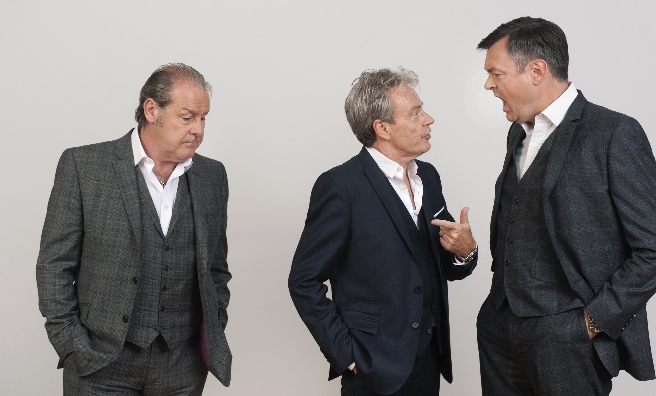@ King’s Theatre, Edinburgh, until Sat 2 Apr 2016
These days, Seventies TV comedy makes a tricky customer as a topic for a show. You either cherry-pick the acceptable bits and come over all misty-eyed and rose-tinted like some cheesy clips show filler, or ignore all context and get sneery and condescending and “weren’t all 70s TV stars paedophiles?” like a leftie panel show puppet. This little beauty, starring the King’s Theatre’s perennial panto trio of Allan Stewart, Andy Gray and Grant Stott, openly and obviously leans towards the former, but does so in a way that revitalises the scene, so that even the most right-on cynic will have to confess the 70s weren’t all bad.
Canned Laughter is the story of fictional comedy trio, Wee Three. Starting as a Grumbleweedsy musical club comedy act, they get a break playing Sunday Night at the Palladium, and, off the back of it, a TV series. The hitch? The producers only want two of them. The trajectory of these three equals thus heads in very different directions, with their agent, Maggie (Gabriel Quigley) often acting as referee.
The story is told in retrospect from the current day. Gus (Gray) arrives unannounced after twenty-five years in the dressing room of Alec (Stewart), who’s still successfully treading the boards. He has an auto-biographical play, Canned Laughter, to share, and this is a springboard for their now hazy recollections of fights, lights and hit sketches.
Francis O’Connor‘s nifty set allows us to switch quickly from dressing room to big stage to TV studio, while a clunk, a crackle and a flicker of the stage lights (by Ben Cracknell) alerts us to a switch from dialogue into personal recollection. Under the direction of co-writer Ed Curtis, it’s economically and atmospherically done.
As a straight comedy show, some of the sketches might seem horribly hackneyed, but framing them in this story has a transportational effect, allowing us to enjoy, as new, 70s-esque humour (without the racism), be it a comedy Norwegian misunderstanding knock-knock jokes (OK, maybe a little racism), or a pair of misfiring maracas (with attendant innuendos). The old music hall boys had craft and timing, and Gray and Stewart, who get to deliver the bulk of the set-piece sketch stuff, are nothing but old pros. Their double act material, heavily modelled on Morecambe & Wise bears comparison with those two greats. They play all the right comedy notes, and in the right order. Stott plays Rory, the failed, tragic one, but he too is funny when he gets his spotlight, and elsetimes portrays his character’s downwards spiral very well.
There’s a few duds – a “hair today, gone tomorrow” bald joke should have been shaved. The audience would also benefit from having been there – a singalong of Chanson d’Amour, references to Rosemary Clooney, even a Frank Spencer impression might fly over young viewers’ heads. It’s noticeable how loud the laughs are from a.) older members of the audience, b.) people so familiar with their panto work they’ll howl with laughter before anything funny has happened.
But really, this is a lovely little piece for any viewer. All three’ll be back for the panto but this is way more than just a useful stop-gap. It gives this trio’s comic skills a new medium in which to shine.
